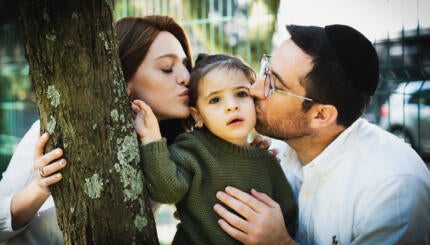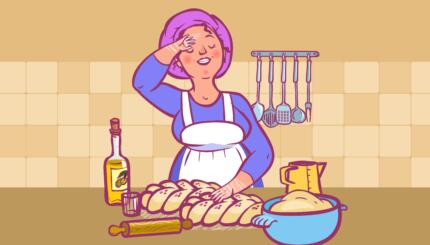“Ken, what’s your Hebrew name?”
The question came from my Israeli friend, Michal. We were standing in her kitchen at one of the weekly Shabbat lunches she hosts with her American husband, Josh. It was a good question, but before I reveal the answer, a little background. With Michal, as with most Israelis and religious people, I must handle my Hebrew with care. It’s dangerous to pretend to know more than I actually do. Being a monoglot American with a godawful Hebrew-school education, it’s way too easy for me to sound stupid.
But my Hebrew name? I knew that thing like the back of my yad.
“Kalman,” I said, with a proud sense of Judaic certainty.
“Kalman?”
With your help, My Jewish Learning can provide endless opportunities for learning, connection and discovery.
“Kalman ben Z’chirah Mesha.”
“That’s not Hebrew.”
“What?”
“That’s not a Hebrew name,” said Michal.
Josh, who has lived in Israel and speaks fluent Hebrew, came over and reported that Kalman Z’chirah Mesha was in fact a Yiddish name.
“Um… my parents always told me that was my Hebrew name,” I said, stupefied.
Land of True Jewish Ignorance
With one question, I had immigrated to a whole new world of Jewish guilt: The Land of True Jewish Ignorance. To not know the difference between a Hebrew name and a Yiddish name is one thing; to not know which category your own sobriquet belongs is profoundly embarrassing. I suddenly felt judged. Unfavorably judged.
I like to think I have a decent sense of the contours of my ignorance, and I’m always on the lookout to learn more. But no matter how many Sholem Aleichem or I.B. Singer stories I read–translated out of the mameloshn and into American, of course–I’m still almost completely ignorant of the mechanics of the true Jewish languages. Mine is a Jewish culture in translation.
The Language of the Jews
I’ve read that there were once fierce wars about what was going to be the language of the Jews. Though by the time I was born, in 1969, in New York, far from the Jewish state, it didn’t really matter. English was my Jewish language. Period.
Yes, I felt ashamed about l’affaire Kalman, but it was really only a shame I could share with Josh and Michal in their kitchen. Virtually every other Jew I know is an English-only person, and I can’t imagine many of them hoisting a dusky Semitic eyebrow at me for thinking that Kalman was a Hebrew name.
Of course, the notion that one could give a kid a Jewish name that wasn’t a Hebrew name doesn’t just belong to me and my parents: it belongs to Jews throughout the Diaspora, especially in the United States. Dovid Katz, in his Words on Fire the Unfinished Story of Yiddish, sums it up nicely:
The vast majority of American Jews in the 20th century may have been content giving their daughters and sons Jewish names, often according to the Ashkenazic tradition of naming for deceased relatives, but they were not at peace with the idea of their children using those names in everyday life.
Notice how Katz says that America Jews gave their kids “Jewish names,” not “Hebrew” or even “Yiddish” ones. An important distinction, and one that’s quite relevant here. He continues:
They were well-kept secrets, strictly for internal use, for example, at birth, Hebrew school, bar-mitzvah, marriage (and divorce where applicable), death, and of course to make grandma and grandpa happy with their little “Léyzer” or little “Málkale.” That is not to say that American Jews joined the precise naming traditions of the Christian majority. They did not. They steered clear of overtly Christian forenames like Christopher and Christina, and some were uncomfortable with more mildly Christian names like Matthew and Peter, though Paul sometimes escaped the association. A large number of popular American English names, such as Alan, Debbie, Edward, Mark, Sharon, Stacey, Steven, became the norm for parents, who usually chose a name on the basis of sharing the same first sound with the Jewish name of the dead relative being “remembered in perpetuity.” The great American Yiddish lexicographer, Alexander Harkavy, appended a list of “name conversions” to his famous trilingual Yiddish-Hebrew-English dictionary in 1925. In it, Harkavy also provided user-friendly American English spellings of traditional Yiddish names, for example, the female Charna, Malla, and Pesha; the male Alter, Kalman,–
Kalman is a “traditional Yiddish name”! Oh, Words on Fire: where were you on that most embarrassing of Shabbats? JBooks.com actually ran a review of this book, back when I first started editing the site in 2004. But I never got a chance to actually read it. (Alas, I read far more Jewish book reviews than Jewish books. Occupational hazard.)
The review of Words on Fire was written by an American-born Israeli named David Margolis, who died in 2005. I think about Margolis, who went from being a secular Hippie to a Carlebach-powered believer and eventually left the Land of the Free for the Home of the Jews. Had I bothered to do more than edit Margolis’ 800-1000 words on Katz–had I taken the time to read the actual book–I would have completely avoided the embarrassment that day in Josh and Michal’s kitchen.
–and Zelig. But these Yiddish names in Englishlike spelling never became popular (except for humor, as in Woody Allen’s 1983 film Zelig).
Ah, me and Zelig! I remember, in Stardust Memories, someone comes up to Woody’s character and asks for an autograph for their sons: “To Kevin and Mendel…” Woody responds, “Kevin and Mendel? What are they, children?”
We feel funny about Jewish names when we hear or say them in public. Or perhaps it’s less so nowadays. About five minutes ago, you’ll recall, a person calling himself Matisyahu was a real-and-true pop star.
Kalman: Yiddish or Hebrew?
But back to Kalman. Was it possible that my parents chose to give me a Yiddish, rather than Hebrew, name as a statement of some sort? Remember, I was born two years after the radicalizing events of 1967. Could Mom and Dad have been making some kind of secularist, or even anti-Zionist, move? Why have they been telling me all these years that Kalman was “Hebrew”? And was the lack of a Hebrew name meant that I was not, you know, really a Jew?
So I asked my dad (via email), Kalman: Yiddish or Hebrew?
“It sure is Yiddish,” he wrote. When he was a kid, back in the1940s, in Brooklyn, Yiddish names were the rule. “There were no Hebrew names.” As he recalls–and he was very quick to say that he couldn’t vouch for the accuracy of his memories–these names were tributes to the dead relatives after whom he and his friends were named. Since they were people from the Old Country, it made sense to go with the Yiddish style. When it came time for him to name his children, he kept the tradition going, and in fact, seems to have followed the formula that Katz laid out in Words on Fire.
“You were named after my Uncle Harry’s mother (something with a K–didn’t know her name exactly), because no one was named after her, and I wanted to use my favorite uncle’s mother’s name.” My dad added that “Mesha is Moshe in the Litvak vocabulary, and we are Litvaks.” Litvaks! Who knew? I certainly didn’t, and no one bothered to tell me this until I was, um, 39 years old.
What else, I now wonder, don’t I know?
Very good question.
Moshe
Pronounced: moe-SHEH, Origin: Hebrew, Moses, whom God chooses to lead the Jews out of Egypt.
Shabbat
Pronounced: shuh-BAHT or shah-BAHT, Origin: Hebrew, the Sabbath, from sundown Friday to sundown Saturday.


